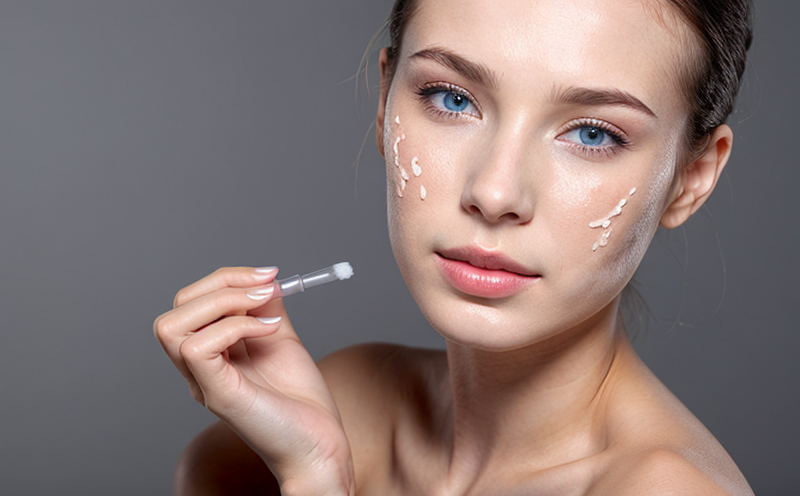Sensitization Testing for Cosmetic Sprays and Mists
In the cosmetics industry, ensuring that products are safe and do not cause skin irritation or sensitization is paramount. Sensitization testing for cosmetic sprays and mists specifically focuses on identifying potential allergens and irritants that could lead to adverse reactions upon contact with the skin.
Skin sensitization refers to a condition where an individual develops an allergic reaction after repeated exposure to certain chemicals or compounds in a product. This type of reaction can be severe, leading to dermatitis, itching, redness, swelling, and even more serious conditions if not addressed promptly. Cosmetic sprays and mists are particularly challenging due to their volatile nature, which allows the active ingredients to penetrate the skin more readily.
The testing procedure involves exposing human or animal skin (depending on regulatory requirements) to the cosmetic formulation under controlled conditions over a specified period. The test aims at identifying substances that can cause an immune response leading to sensitization. ISO 10769-1 and IEC TR 62760 are commonly referenced standards for such testing, ensuring consistency with international guidelines.
Preparation of the specimen is critical; it requires precise formulation replication along with adherence to the test protocol outlined by relevant regulatory bodies like the European Union's Cosmetics Regulation or the FDA’s Good Laboratory Practices. Specimen preparation includes dilution of the cosmetic spray/mist according to standard procedures, ensuring that all components are present in concentrations similar to those found in actual use.
The testing process itself is intricate and involves multiple steps:
- Application of the test substance on the skin using standardized methods
- Incubation periods during which any signs of reaction are observed
- Evaluation by trained personnel to determine whether sensitization has occurred
- Data recording and analysis to ensure accurate reporting
Once conducted, these tests provide valuable insights into the safety profile of a cosmetic spray or mist. Compliance officers, quality managers, R&D engineers, and procurement teams rely on such data to make informed decisions about product development, formulation adjustments, and final approval.
The importance of this testing cannot be overstated given the increasing awareness among consumers regarding personal care products' health impact. By identifying potential sensitizers early in the development process, manufacturers can mitigate risks associated with recalls or negative publicity. Moreover, adherence to stringent regulatory requirements not only protects consumer health but also enhances brand reputation and trust.
Real-world applications of this testing extend beyond just ensuring compliance; they play a crucial role in enhancing product safety while allowing innovation within the industry. Understanding how different ingredients interact under various conditions allows researchers to refine formulas continuously, ultimately delivering better products that meet both regulatory standards and consumer expectations.
Benefits
Conducting sensitization testing for cosmetic sprays and mists offers numerous benefits:
- Enhanced Consumer Safety: By identifying potential allergens early, manufacturers can prevent serious adverse reactions that might otherwise occur.
- Regulatory Compliance: Ensures adherence to stringent regulations set forth by organizations like the EU Cosmetics Regulation and FDA GMP guidelines.
- Innovation: Provides valuable data that supports ongoing research into safer, more effective formulations.
- Better Brand Reputation: Demonstrates commitment to product safety which translates into increased customer confidence and loyalty.
Through rigorous testing procedures, companies can build a strong foundation of trust with their customers while maintaining high standards of quality control throughout the entire production cycle.
Quality and Reliability Assurance
The success of any cosmetic product lies in its ability to deliver consistent results across all batches. To achieve this level of reliability, it is essential to implement robust quality assurance measures at every stage of development—from formulation design to final production.
In terms of sensitization testing specifically, consistency plays a vital role. Each batch of the cosmetic spray/mist must undergo identical preparation and application processes to ensure that variations in outcome are due solely to differences in the product itself rather than external factors. This approach helps maintain uniformity across different batches, ensuring that all products meet the required safety standards.
Additionally, thorough documentation is crucial for maintaining a reliable record of each test conducted. Detailed records help track trends over time, allowing for continuous improvement and adaptation based on new findings or changes in regulatory requirements. Regular audits by internal teams and external inspectors further reinforce reliability by providing an objective assessment of the quality assurance system’s effectiveness.
By focusing on these key aspects—consistent preparation, thorough documentation, and regular auditing—a company can ensure that its sensitization testing remains both accurate and reliable, thereby safeguarding consumer health while fostering innovation within the industry.
Environmental and Sustainability Contributions
Sensitization testing for cosmetic sprays and mists contributes positively to environmental sustainability through several means:
- Eco-friendly Formulations: Identifying potential allergens early helps minimize the inclusion of harmful chemicals in formulations, promoting the use of natural or biodegradable ingredients.
- Reduced Waste: Accurate testing reduces the likelihood of producing batches that fail safety checks, thus cutting down on wasted resources and energy.
- Energy Efficiency: Standardized procedures help optimize production processes, reducing overall resource consumption.
- Ethical Sourcing: Ensures that only sustainable materials are used in the formulation of cosmetic sprays/mists.
The commitment to sustainability extends beyond just the testing phase; it encompasses every aspect of product development and manufacturing. By prioritizing eco-friendly practices, companies not only contribute positively to environmental conservation but also set an example for others within the industry to follow suit.





